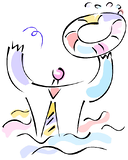During a recent spin class, my instructor seemed vaguely familiar - but if this was who I thought it was, he appeared transformed. This instructor’s hair was darker and bushier; he was a bit beefier and a little easier going than I remembered. As I pondered the resemblance, the instructor shouted, “Dig! Dig! - Dig!” This sealed the deal. This had to be Doug – how many spin instructors actually use that expression in exactly that tone of voice?
After class, I decided to say hi and confess to Doug that I barely recognized him. He told me that he wasn’t surprised; he had gained quite a bit of weight because he had been very ill with a rare autoimmune disease that attacked his brain. After a year, he was still undergoing chemotherapy. He said he was glad to be alive and then added, “Yoga saved my life.”
“Say more,” I asked, feeling my “yogi” curiosity kick in.
Apparently, Doug had been practicing yoga several times a week for many years. One day, he noticed that his balance had been progressively (and inexplicably) getting worse for a while. This alarmed him, so he decided to go to the doctor.
“I think there’s something wrong with my brain. My balance is off, and I seem to be losing my short term memory,” Doug explained to his highly regarded physician. Sadly, the doctor dismissed Doug’s concerns and suggested that Doug might have the flu. “Give it another week,” he told him.
But Doug knew himself better than that. Years of yoga indicated to him that something was very different and very wrong about how he was moving through space – and he didn’t notice any flu-like symptoms. So he decided to seek the advice of a second doctor, who also dismissed his reported symptoms as probably something minor. Finally, another week or so later, a concerned family member made a call to a physician friend who agreed to give Doug an MRI.
Hours later, Doug found himself in intensive care, with several intravenous needles inserted in his arm. He had an autoimmune disease that had attacked his brain. Large black areas appeared in his brain scan. Not only was his ability to function at stake, but also his life. The doctor advised him that he had no time to lose in getting treatment.
Obviously, Doug survived. After a year of difficult convalescence, including learning to walk again and adjusting to a major hearing loss, Doug is back to work and teaching spin classes. He credits his self-awareness and his yoga practice with saving his life.
While yoga was the tip off, Doug also had the confidence to trust his self-knowledge and to persist in his beliefs, regardless of what the “experts” told him. As a result, he is one of just a few hundred survivors of this rare disease.
Doug’s story resonated with me. How many times have I dismissed my inner voice, when I hear it telling me something is wrong? Call it a gut feeling, a hunch, or an instinct, but the implication seems the same. It’s important to pay attention and to honor your hunches. Check them out. Be mindful of your body. Notice the specifics of how you feel when you are well. Notice how it feels when you are tired, or when you eat and drink different foods. Pay attention to how your chest and stomach feel when you meet someone you like, versus where and how your body feels when you are in a challenging situation. Notice when long-term patterns change. These are clues, and clues provide important information.
Time and time again, I find that our bodies will tell us what our conscious minds cannot discern. All we need to do is listen (somatically), and learn to interpret and to honor the signals we receive.
Know yourself; know your body. Trust that knowledge. It might just save your life.
